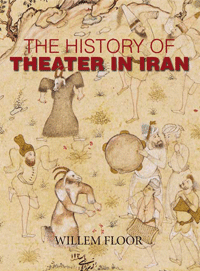 Stop the politics of labeling Stop the politics of labeling
The only way to protect it is to open our minds and the doors of the Iranian Women's Studies Foundation conferences
Halleh Ghorashi
September 19, 2005
iranian.com
Being part of the last Iranian Women's Studies Foundation (IWSF) conference in Vienna, experiencing the clash of ideas and positions there, and explaining it over and over again to my friends and relatives gave me the idea to write about the event.
However, this idea remained in my mind because of the complexity of the events: there is just so much to analyze and to say. The recent discussions on the Net, starting with the piece by Golbarg Bashi [See: "They know best"], have not given me the chance or time to postpone my idea.
Let me start by writing about the way I experienced the clashes.
The Vienna conference was the second IWSF conference that I had attended. I had been at the IWSF for the first time in 2004 when it was in Berlin. I had, of course, heard about other IWSF conferences from many people and had read the pieces that were published in the IWSF magazine. For this reason, it was clear to me what to expect from IWSF.
From one side, I understood that IWSF is a place where kindred souls meet. Hundreds of Iranian women from all over the world gather to share their ideas, ideals, feelings, and experiences. Many have found old childhood friends, old comrades, and families at these conferences. Thus IWSF is a transnational reunion for many Iranian women who find energy, love, and power through participating in this conference.
On the other side, we know that the core of the people who have participated in IWSF conferences for years are people with political pasts and presents. It is this spirit of activism that has long dominated the sphere of the conferences. In the early years of the conference in1990s, leftist political ideas dominated the conference. This dominance also meant a harsh, and even, dogmatic' approach to other political opinions and strong disapproval, if not hatred, of the Islamic regime.
 These women with horrible memories of post-revolutionary Iran displayed strong resistance towards any action that could even slightly be construed as a compromise to the Iranian regime. For these women, the IWSF conference served as a fortress from which they fought against the injustice to women and against the Islamic regime in Iran. These women with horrible memories of post-revolutionary Iran displayed strong resistance towards any action that could even slightly be construed as a compromise to the Iranian regime. For these women, the IWSF conference served as a fortress from which they fought against the injustice to women and against the Islamic regime in Iran.
Thus, from IWSF's beginning, women who were invited from Iran as guests were often attacked verbally by some. They were not trusted by some simply because they stayed in Iran, not criticizing the regime hard and loud enough, or because they wore headscarves during the conference.
By the end of 1990s, we observe that many scholars living outside Iran started to write about the rise of Islamic feminism in Iran, in the light of reformist movement in Iran. These scholars were also attacked and disregarded from the beginning. They were labeled puppets or associates of the regime.
In the IWSF there was a growing siege mentality: some felt that the organization had to be protected both from Iranian activists from Iran and from Iranian scholars in diaspora. Here we see the opening of a gap between scholarship and activism: a gap that is present within the feminist movement as well.
After being openly insulted, most of the prominent Iranian women scholars living in the West no longer attend IWSF conferences. Others don't even consider attending because of the stories they've heard. Yet, this does not mean that no scholars attended the conference. The ones who did mainly approved of or surrendered to the action -- read strong anti-Iranian regime -- oriented approach in the conferences.
This process has resulted in the formation of a core group within the IWSF which is referred to by others as the "radical left." This group is especially famous for shouting insults, and disturbing the sessions that in their opinion endanger the identity of IWSF and, hence, their fortress. During my talks with different people and from my own observations of the last two conferences, it is obvious that the numbers of this core group are decreasing.
 During the IWSF in Berlin, I observed that the actions of this core group were cheered by half of the participants but disapproved of by the other half. I was amazed to see that there were so many participants who openly disapproved of the actions of this core group. Often it is so that in these cases the one who shouts the most and loudest dominates the situation, yet in Berlin this was not the case. During the IWSF in Berlin, I observed that the actions of this core group were cheered by half of the participants but disapproved of by the other half. I was amazed to see that there were so many participants who openly disapproved of the actions of this core group. Often it is so that in these cases the one who shouts the most and loudest dominates the situation, yet in Berlin this was not the case.
In my observation, the power struggle was equally divided. Yet the ones who were most insulting towards others were from this core group. The other group tried to balance the situation by remaining calm.
This balance in 2004 was not present in the Vienna conference at all.
This time nearly the entire conference was dominated by the insults and the obscure behavior of some of the members of the core group. This time the guests from Iran were not just activists, but were also scholars who were not directly part of the women's movement in Iran.
These scholars living and teaching in Iranian universities had completely adopted the particular discourse in Iran, with its religious connotations. This, of course, did not mean that they were spies of the regime (as it was suggested) or insensitive to the women's cause in Iran. They were, however, definitely talking from an Iranian context.
Dr. Shamsolsadat-e Zahedi was in my view a quite eloquent speaker yet her rhetoric was very much part of the current Islamic Iranian discourse. This eloquence was misplaced within the IWSF conference for various reasons.
First, most of the participants of IWSF have for too long been "too" far from Iran. They had not been part of this somewhat religious discourse and could not understand it in any other way than as a link to the Iranian regime.
Second, the speech was too academic or even too much of a kind of university lecture. Conference participants often expect a kind of activist lecture even from academics.
Third, there were also some problems in the case of time management which meant that the lecture took too long and as a result there was not enough time for Q and A (which is the most essential part of IWSF conferences).
All these factors together resulted in a terrible outburst of anger from the public and some even went so far as to insult the speaker openly by calling her "mullah" or even a "facist".
This emotional reaction did not stop when the lecturer sat down. It continued during the time of the second lecturer from Iran.
During these insults and shouts there was a large group of participants who opposed these kinds of reactions. However their opposition remained passive. Some told me that they would not participate in IWSF conferences ever again. Others were just looking for answers to the question: why so much anger? Why so many insults? When will this ever end?
 These are valid questions: when are we going to be honest with ourselves and accept that activism is both about claiming our rights and about a sharp distinction between our allies and our enemies. This sharp distinction means that we need to respect the differences among us. These are valid questions: when are we going to be honest with ourselves and accept that activism is both about claiming our rights and about a sharp distinction between our allies and our enemies. This sharp distinction means that we need to respect the differences among us.
If we do not accept and respect our different ways of feminism and activism, if we believe that the only way is our way, then our allies remain limited. If we believe and act as if anybody who comes from Iran, in addition to the many well-read Iranian scholars, is an ally of the regime, then our enemy becomes too big to fight.
When we start with irresponsible and simplistic labeling of our active second generation who are daring to raise their voices against us, then who is left to become our ally?
If we do not start reflecting upon our actions and honestly redefining our positions, the enemy will remain too big to defeat. The first step towards defeating the enemy is not to exaggerate it. The second step is to be different than our enemy. How can we position ourselves as different from the Iranian regime if we are not tolerant towards our own differences?
If we want to move forward we have to stop insulting others who think differently than we do. Do not get me wrong. I do not mean here the violent other:
I am talking about our potential allies and our next generation. We have to stop the politics of labeling: disregarding the other by labeling it as liberal, or spy, or fascist, or any number of other appellations... The politics of labeling is just a sign of the weakness of the arguments.
 IWSF is one of most beautiful and worthy achievements of women and especially of Iranian women. Let's celebrate it and not destroy its spirit by insulting and labeling each other. We cannot protect IWSF against the Iranian regime by creating a simplistic and dogmatic fortress. IWSF is one of most beautiful and worthy achievements of women and especially of Iranian women. Let's celebrate it and not destroy its spirit by insulting and labeling each other. We cannot protect IWSF against the Iranian regime by creating a simplistic and dogmatic fortress.
The only way to protect it is to open our minds and the doors of the conference and to attract as many women as possible to join us. We need to learn from each other and to support our next generation so that they can be courageous, creative and free. We have to encourage young women such as Golbarg Bashi to express their ideas, to criticize us, and to put a mirror in front of us so that we can judge and reflect upon our actions.
Thank you Golbarg for being so brave.
About
Halleh Ghorashi is Professor in Management of Diversity and Integration Department of Culture at the Organization and Management Vrije Universiteit in Amsterdam, The Netherlands.
|